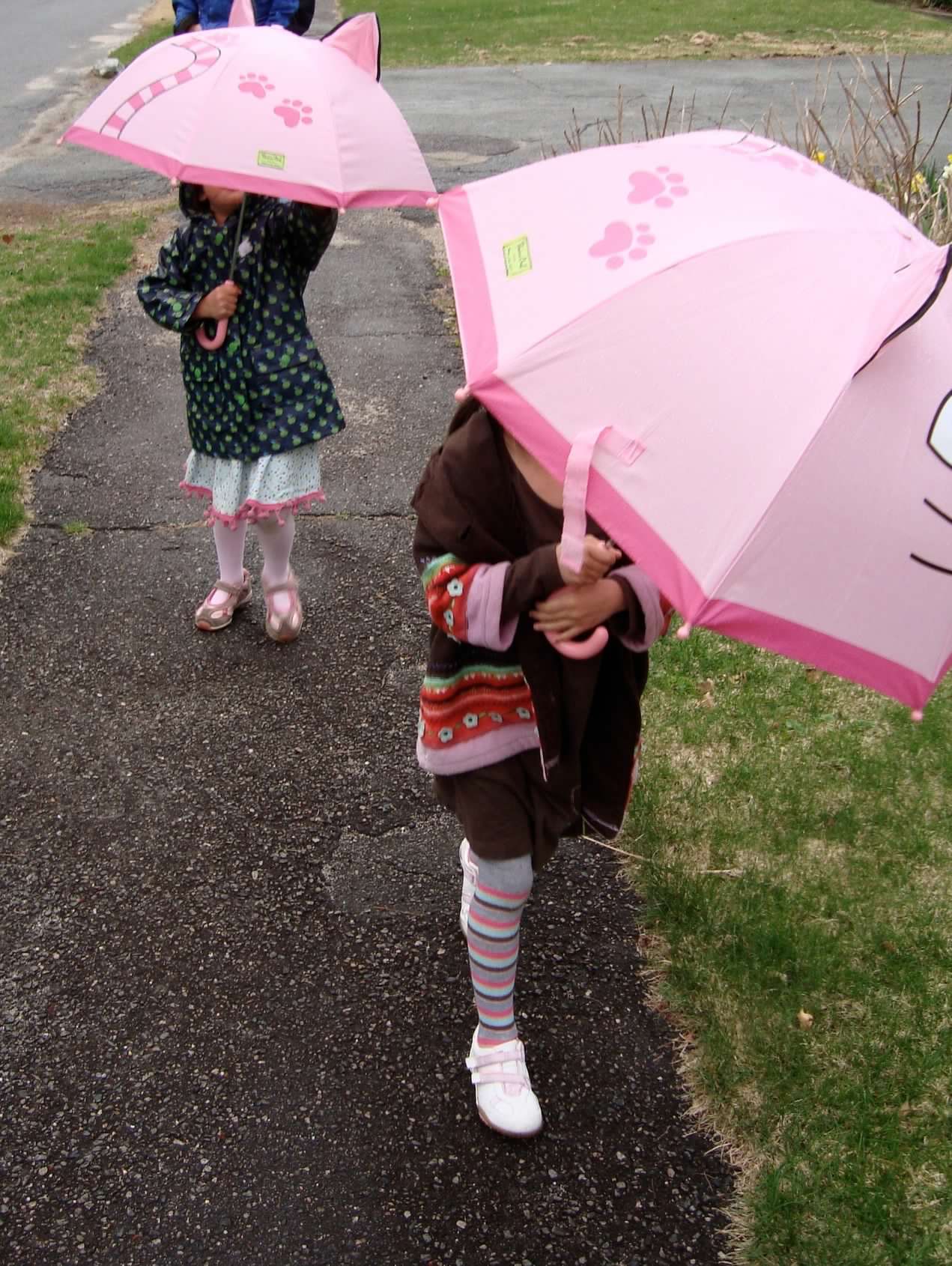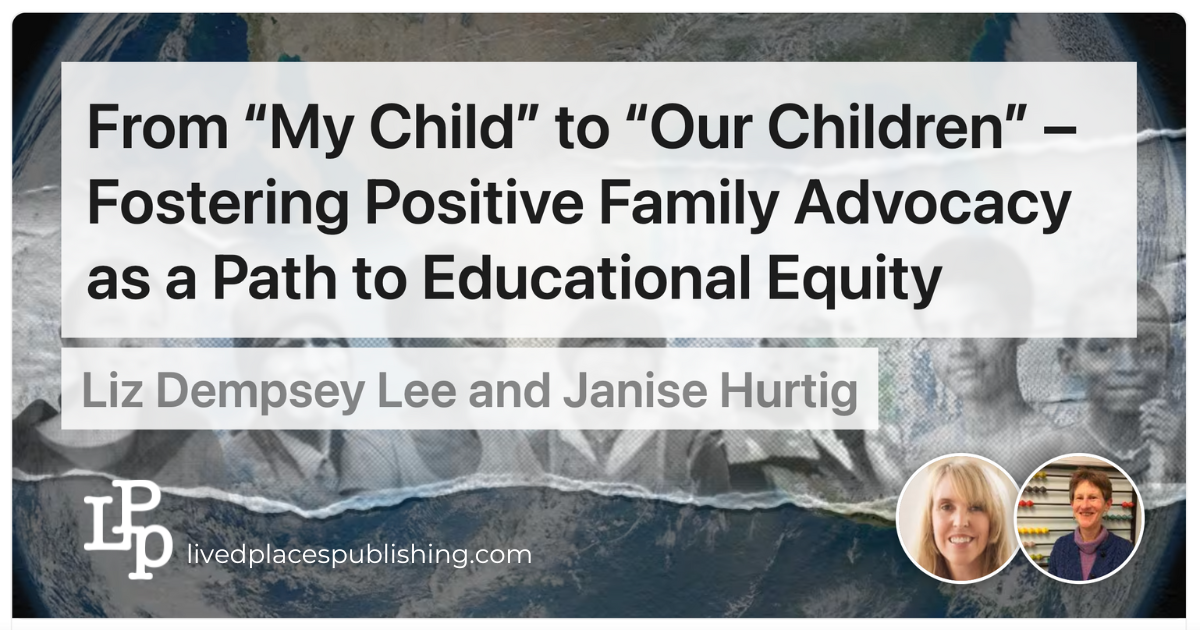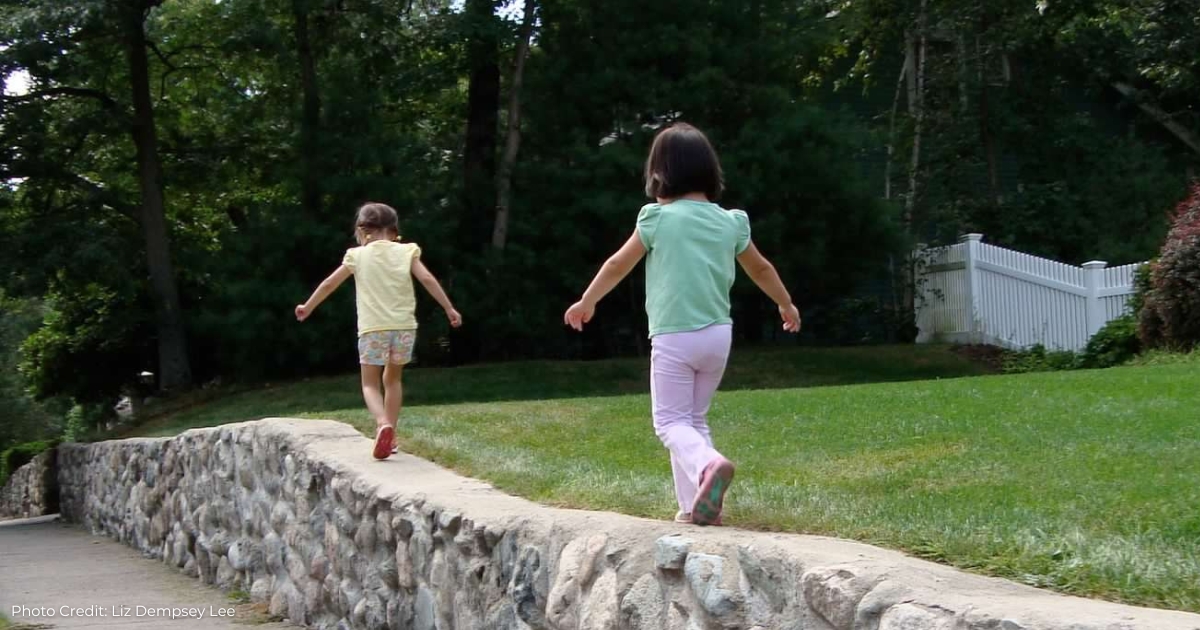by Liz Dempsey Lee PhD
—
Advice in the Frozen Food Aisle
When my girls were little, I received all kinds of “helpful” feedback when at the grocery store. One warm spring morning, while really, really tired, I started my shopping with two kids in tow. Alice (age 4 1/2) was going through a “why” phase. Why does that need to be frozen? Why is that box that color? Why can’t we go home? Meanwhile, Alana (age 3), who had nicknamed herself “ACTION!,” was being … active. She’d run ahead, circle back, check in with me, dart in front of someone’s cart, grab something off the shelf, and put it down somewhere else. Honestly – I couldn’t keep up with either child and I must have sounded exasperated.
An older white man stopped me in the frozen food aisle and began to offer his thoughts. If I spoke more softly. If I came at a better time of day. If I had been better prepared. And then, the kicker. Alana came up behind me and peered at him from behind my leg. She was hesitant around men, recently glaring at a waiter and shouting “Go away MAN! I don’t like you, MAN!”. Sure enough, he addressed her directly and she hid. “She’s a bit shy,” I told him. “Never call your child shy!” he stated firmly. “You’ll ruin her forever.”
Ruin her forever? Really? Standing there in the frozen food aisle, I’d blown it? Well, whoops. I puzzled over this idea as the man in question shared all his thoughts with me in a preachy rant. Eager to escape, I thanked him (why!!??), took my kids home, and wallowed in my failures as a parent.
Parent the “Right Way.” Or Else.
 As Alana and Alice made their way through preschool, I heard variations of this message everywhere. “Pretzels have no nutritional content, try carrot sticks or your child will gain weight.” “Start extra math before kindergarten or your child won’t make it to the accelerated track in high school.” “If you wait to start soccer, they’ll never make the travel team in middle school.”
As Alana and Alice made their way through preschool, I heard variations of this message everywhere. “Pretzels have no nutritional content, try carrot sticks or your child will gain weight.” “Start extra math before kindergarten or your child won’t make it to the accelerated track in high school.” “If you wait to start soccer, they’ll never make the travel team in middle school.”
I observed an imbalance. Some parents in my high-income suburb threw themselves fully into advocacy for their children. They leveraged both their voices and their resources to achieve the specific educational ambitions they believed would contribute to their child’s future success, for example, rewarding early reading attempts with chocolate or enrolling their preschooler in traditional (and pricey) math instruction.
Meanwhile, other families had different and arguably more consequential concerns. Some were priced out of their rentals and right out of town, as housing prices soared. They struggled to find affordable housing in communities with decent schools. Others whispered about their challenges convincing preschools to expand their libraries to include more books about people of color. Their attempts to include books that better reflected both their own children and the entire classroom were politely rebuffed.
This imbalance emerged time and again. The intensity and visibility of this first type of advocacy gave me pause, particularly when contrasted with the depth of problems, and the lack of attention, experienced by the second group. I wondered, why did the advocacy of some parents get attention while the needs of others were hardly discussed?
Unsolicited advice in the frozen food aisle offers us one possible answer. That gentleman believed he was coaching me to parent “correctly,” and this mattered because he believed that if I failed, my children would suffer. In other words, “parent the right way, or else.” Books, websites, social media, educational and parenting businesses, and fellow parents all share their “right ways,” too. And before you know it, you are drowning in overwhelming amounts of contradictory child rearing advice.
No wonder parents advocate so intently for their children around topics that have little impact on a child’s future. Furedi (2001) calls this “parent determinism,” “the idea that every action a parent takes reverberates into adulthood either for better or worse (Lee, 2020, p. 19). Under these circumstances, the stakes are very high indeed.
This is a zero-sum parenting belief. This belief asserts that you must parent well enough because there are finite resources and your child’s future success is dependent on how many advantages they accumulate in order to capture these resources . If your child fails, someone else will absorb those resources and leave your child behind. According to this philosophy, the consequences of failing as a parent are severe and lasting – you’ll ruin them forever.
Zero-Sum Parenting Advocacy
Zero-sum parenting is a logical outcome of Lareau’s (2011) “concerted cultivation,” which positions parents to funnel children into activities designed to “cultivate” them into successful adults (p. 2-3). Advocacy takes this idea to the next level, lobbying educators to participate in parental bids to avoid potential future problems. This form of family advocacy is, in my view, often unproductive. This type of advocacy is more likely to miss, or distort, learning. For example, in communities with high-income families, many parents enroll their children in outside mathematics programming. These programs are typically more traditional and focus on arithmetic rather than mathematics. The result is comparable to going to the gym and exercising only your left arm. Certainly, your left arm needs it, but by excluding the rest of body, you potentially cause more problems than you solve.
Moreover, family engagement in education has an “inflection point” (Li et al., 2015, p. 17). Some engagement supports student growth and learning. However, too much engagement can have significant negative effects on children. Over-engagement takes various forms. Some families overcommit their children after school, sending them to math classes, music classes, sports practices, and more. Others double down on one area, perhaps requiring them to learn multiple instruments and practice for hours each night or specializing in a sport and joining multiple teams at the same time. Once that line has been crossed, children are at a higher risk of “elevated maladjustment” (Luthar et al., 2013). They are more likely to report self-harm and other mental health challenges, engage in petty crime, abuse alcohol and drugs, and ironically, actually learn less (Ciciolla et al., 2017, Li, Obach, and Chang, 2015, Luthar et al., 2013, and Warner, 2005).
Zero-sum messages like “you’ll ruin her forever” seem likely to encourage over-engagement to the point of micro-managing – all in the name of being a “good parent” and saving children from future failure. After all, if I had believed the man in the grocery store and taken to heart the idea that certain words could make or break my children, I likely would have taken that granular view of parenting into my children’s classrooms.
Zero-Sum Parenting and Educational Equity
Above all, this type of unproductive advocacy can pull resources and attention away from other forms of meaningful family advocacy. The focus of other family advocacy can encompass serious issues such as: “Is my child being disciplined more harshly because of the color of their skin?” “Does my child’s gender identity make them unsafe at school?” “Can the school stop the religion taunts my child hears?” We know microaggressions, discrimination, and other injustices negatively impact a child’s day-to-day life at school and cause social, emotional, and academic harm (Gandaras & Contreras, 2009, Rothstein, 2004, and Shapiro, 2004). Unlike many parents engaging in zero-sum parenting advocacy, advocacy in the above situations is crucial, because the potential for negative consequences in these scenarios is immediate and significant.
I believe that zero-sum parent advocacy and the challenges some families face in being heard are interrelated. In 2014, Making Caring Common, an organization affiliated with Harvard University, published, The children we mean to raise: The real messages adults are sending about values, a survey of 10,000 middle and high school students from diverse settings. The survey reflected that 80% of students “report[ed] that their parents are more concerned about achievement or happiness than caring for others” (p.1). Furthermore, the authors notes that in the survey, “ranking achievement first was associated with low levels of empathy” (p. 11). Might being overly focused on grades and/or individual happiness, combined with a lack of attention to caring, result in harassment and discrimination among students? It seems possible. If so, zero-sum parenting could be one factor creating contributing to inequitable school environments.
Where does this leave us?
The efficacy of family advocacy varies widely in relation to a family’s social identity and, as educators, we need to walk into the world of advocacy directly and deliberately. First, we can learn tools and strategies to hear, assess, and address fears underlying each family’s advocacy. Next, we need to have direct, honest, and yes, uncomfortable conversations with families about the heart of their concerns. This requires humility and compassion on our parts, and especially the ability to evaluate ourselves, our classroom, our school, and our teaching for systemic biases.
We may also need to deconstruct the messages parents receive about zero-sum parenting and actively address parent anxiety. Finally, educators should prioritize concerns which negatively impact a child’s day-to-day experience in school and/or interfere with learning or social-emotional well-being, especially those that center around a child’s social identity.
15 years later…
Did I really ruin my daughter Alana forever? Of course not. Both she and her sister are in college and, more importantly, they are happy and thriving. Calling my daughter shy does not appear to have harmed her. A year after my debacle in the frozen food aisle, I gave birth to my third child, Jack. Shortly thereafter I began the journey to my doctorate focusing on the thorny intertwining of schools, parents, income, and educational equity. And after 15 years, am I immune to pressures of zero-sum parenting messages and advocacy? I wish I could say yes. As our world becomes increasingly unpredictable, I still find myself caught up in the minutia of “getting it right” – all the time, or else. The “or else” portion feels more fraught with every passing day, and I end up quietly talking myself back into a more flexible approach to parenting.
Free Seminar: From “My Child” to “Our Children” – Fostering Positive Family Advocacy as a Path to Educational Equity
 In this conversation between Liz Dempsey Lee, author of Parents as Advocates: Supporting K-12 Students and their Families Across Identities and Janise Hurtig, Lived Places Publishing Collection Editor. Liz and Janise will discuss how recognizing and addressing family advocacy is critical to creating educational equity. They will also explore how conflict is a normal and expected byproduct of the family-school relationship and how demystifying and educating families around effective advocacy can build relationships and move educational communities from a focus on “my child” to a focus on “our children.”
In this conversation between Liz Dempsey Lee, author of Parents as Advocates: Supporting K-12 Students and their Families Across Identities and Janise Hurtig, Lived Places Publishing Collection Editor. Liz and Janise will discuss how recognizing and addressing family advocacy is critical to creating educational equity. They will also explore how conflict is a normal and expected byproduct of the family-school relationship and how demystifying and educating families around effective advocacy can build relationships and move educational communities from a focus on “my child” to a focus on “our children.”
- Date: Thursday, 25th April 2024
- Time: 12:00-1:00pm EST (5:00-6:00pm GMT)
- To attend, sign up at the following link: Register here
This seminar is free to attend and open to all.
Liz Dempsey Lee PhD is an educator, consultant, and writer. Her field of expertise is in the interactions among and between families, schools, and communities, and how the concept of equity relates to those interactions. She strongly believes that equity is central to creating just schools, organizations, and communities, and through her company LizDempseyLee Consulting, she works with parents, students, schools, and organizations towards that goal.
Her book, Parents as Advocates: Supporting K-12 Students and their Families Across Identities, is available from Lived Places Publishing or any online retailer.
We want our books to be available to as many people as possible. If you’d like to purchase an individual copy, please email us and we’ll give you a discount code:
IMAGE CREDIT: Liz Dempsey Lee
References
- Ciciolla, L., Curlee, A., Karageorge, J., Luthar, S. (2016) “When mothers and fathers are seen as disproportionately valuing achievements: Implications for adjustment among upper middle class youth,” Journal of Youth and Adolescence, 46(5), pp. 1057–1075. Available at: https://doi.org/10.1007/s10964-016-0596-x.
- Furedi, F. (2001) Paranoid parenting: Abandon your anxieties and be a good parent. London, UK: Allen Lane.
- Lareau, A. (2011) Unequal childhoods: Class, race, and Family Life. Berkeley, CA: University of California Press.
- Lee, E.D. (2020) Win the game or build decent humans? parental perceptions of the family school-relationship across socioeconomic backgrounds, DigitalCommons@Lesley. Available at: https://digitalcommons.lesley.edu/education_dissertations/172/
- Gandara, P.C. and Contreras, F. (2010) The Latino Education Crisis: The consequences of failed Social Policies. Cambridge, MA, MA: Harvard University Press.
- Li, A., Obach, H., Cheng, S. (2015) . American Sociological Association Annual Meeting, 20 August. Chicago: American Sociological Association.
- Luthar, S.S., Barkin, S.H. and Crossman, E.J. (2013) “‘I can, therefore I must’: Fragility in the upper-middle classes,” Development and Psychopathology, 25(4pt2), pp. 1529–1549. Available at: https://doi.org/10.1017/s0954579413000758.
- Making Caring Common (2014) The Children We Mean to Raise: The Real Messages Adults Are Sending About Values. rep. Available at: https://mcc.gse.harvard.edu/reports/children-mean-raise.
- Rothstein, R. (2004) Class and schools: Using social, economic, and educational reform to close the black-white achievement gap. Washington, D.C., DC: Economic Policy Institute.
- Shapiro, T.M. (2005) The hidden cost of being African American: How wealth perpetuates inequality. Oxford: Oxford University Press.
- Warner, J.A. (2015) Perfect madness: Motherhood in the age of anxiety. London, UK: Ebury Digital.



